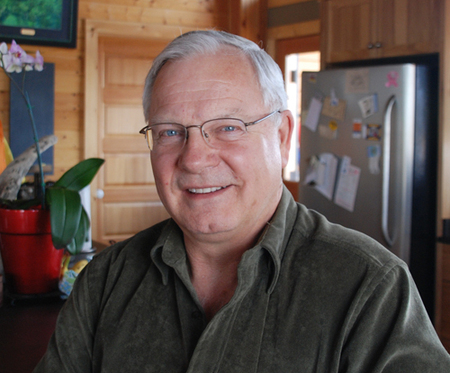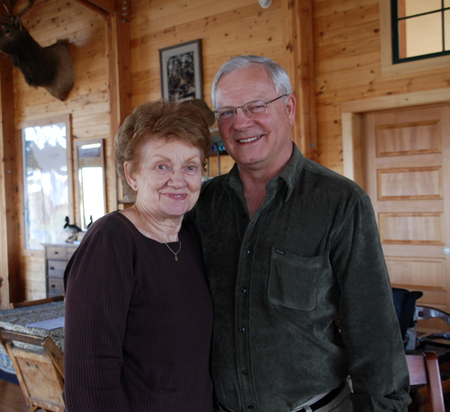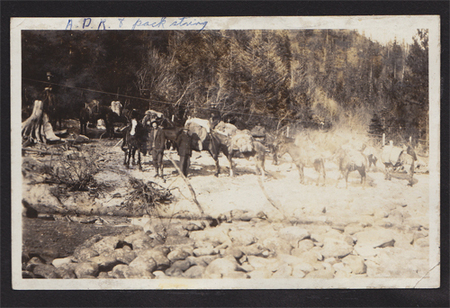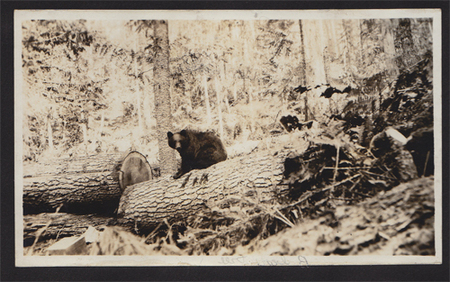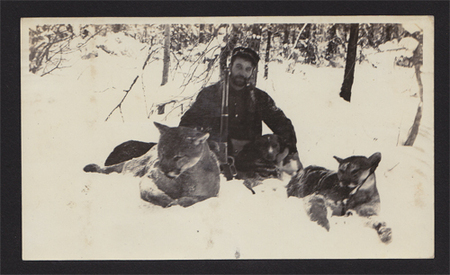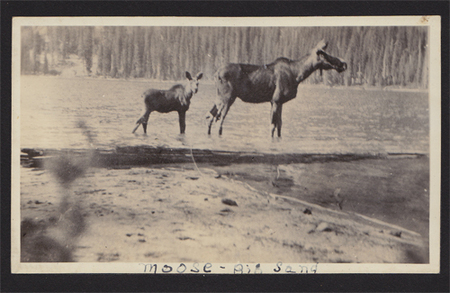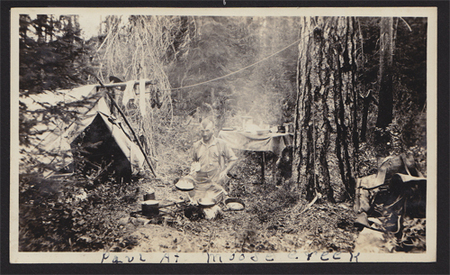Episode 12 : Wilderness Childhood : an interview with Allan Renshaw Item Info
In this episode, titled “Wilderness Childhood,” Allen Renshaw tells us what it was like to spend his young childhood in the backcountry. Growing up at the Selway Lodge shaped Allan’s future, first as a backcountry fire patrol pilot, and later, as a speech therapist. He took the lessons about helping others that he learned from his parents in the wilderness and spent a lifetime helping children in Idaho school districts. Listen as Allan shares stories of his early childhood at the Selway Lodge.
Episode 12 : Wilderness Childhood : an interview with Allan Renshaw [transcript]
00:00:00:00 - 00:00:29:10 Debbie Lee or Jane Holman: Welcome to the Subway Bitterroot Wilderness History Project, which is made possible by a grant from the National Endowment for the Humanities. The University of Idaho, and Washington State University. Part of the project’s mission is to collect, preserve, and make public oral histories documenting the history and people of the subway. Bitterroot wilderness. For more information, please visit our website at SPW lib argue Idaho redo.
00:00:29:12 - 00:00:54:10 Debbie Lee or Jane Holman: And then I think people, I think people get so much out of being in a wilderness setting. Once you take away cars and money and telephones, people are different and they are different to each other, I think. And, and, and then they draw on things in themselves that maybe are a little rusty from our crazy life out here.
00:00:54:10 - 00:01:25:06 Debbie Lee or Jane Holman: Now, I think the ways that people get along when they’re isolated in a place like that, that they place that they want to be, really, it’s a wonderful thing.
00:01:25:09 - 00:02:01:07 Debbie Lee or Jane Holman: Thank you for joining us for the 12th episode of the South Bitterroot Wilderness History Project. In this episode titled Wilderness Childhood, Ellen Renshaw tells us what it was like to spend his young childhood in the backcountry. Growing up at the Selway Lodge shaped Allan’s future, first as a backcountry fire patrol pilot and later as a speech therapist. He took the lessons about helping others that he learned from his parents in the wilderness and spent a lifetime helping children in Idaho school districts listen as Allen shares stories of his early childhood at the South Lodge.
00:02:01:09 - 00:02:32:08 Allan Renshaw: Okay, well, I was born in Kiski, Idaho, to Alvin and Eleanor Renshaw, who owned the subway lodge, spent the first, eight years and a little bit over of my life, kind of off and on at the Solway Lodge between there and Husky. we did have, a, a hunting and fishing lodge. And dad spent his time, serving guests there.
00:02:32:09 - 00:03:02:24 Allan Renshaw: He was also involved with packing for the Forest Service from time to time. And so I became involved with the, the clients that were there, sometimes getting in their way. I’m sure as a young child, the staying at the subway lodge was a unique experience because I was the youngest of, of the family by eight years, younger than my my brother, my nearest sibling.
00:03:02:26 - 00:03:58:26 Allan Renshaw: And that’s, that in and of itself has created a difference in memories of experience. between Jean and Jim and my sister Billy and I, but, the, the experience there was unique in the fact that not only was I growing up kind of as a a lonely, well, maybe that lonely, but only child, but having just the freedom to kind of do what I wanted to do and experience the, the clients that came from a wide variety of, of backgrounds and experiences and, the one experience with, prisoners of war that were stationed at Bear Creek, the ranger station just down river from so
00:03:59:00 - 00:04:25:18 Allan Renshaw: lodge. as they were redoing the bridge that crossed the Solway River. And I was the one that was surrounded by people who had pistols and rifles and and so I had my own pop guns and, I can remember one day sitting out on the Or standing out on the porch and seeing the, the prisoners of war across the river on a sandbar, probably taking a break.
00:04:25:21 - 00:04:56:07 Allan Renshaw: And I was going bang, bang, bang, bang, bang. And looking back on it now, I was thinking, gee, that’s war time prisoners of war. That probably wasn’t taken too well. But, some of them were extremely of good nature. One of them fell over on the sand, and the others covered him up with sand, and a couple more grabbed a couple of sticks and made a, across and stuck in the sand and and over his head, and I said, wow, you know, this is fun.
00:04:56:08 - 00:05:18:05 Allan Renshaw: They’re kind of playing with me. The next day, I walked out onto the bridge with my little pop gun. It was a captain type of affair, and it was going bang, bang, bang, bang. Expecting the same thing. And actually one of them laid down on the sand. But there was one, one individual who came up on the bridge and says, let me see your your pistol.
00:05:18:07 - 00:05:51:21 Allan Renshaw: And I handed it over to him, and he proceeded to throw it into the river. Well, I heard this outcry from the the people in the sand, and the couple of them came up and and shoot him out and dove into the river to, to retrieve my pistol. It looking back on it now, I guess, and with a little bit of information from my siblings, that particular prisoner was not the Italian like the rest of them, but a German, and took much offense at me shooting.
00:05:51:23 - 00:06:21:00 Allan Renshaw: it must have been a week or two after all of that that the, the prisoners were taken out to town. Why? I have no idea. But returned in. One of the Italian prisoners had a small, suit of clothes that was designed for, replicate naval people. It was for his son, actually. But he came over and gave it to me.
00:06:21:03 - 00:06:37:27 Allan Renshaw: I think maybe this is kind of his way of saying. I’m sorry, for the incident that happened. I have no idea where that’s suit is located now, but that was a pleasing, it was a very rewarding experience.
00:06:37:29 - 00:06:49:07 Debbie Lee or Jane Holman: Do you know where these prisoners, were stationed when they weren’t built? Were they just, kind of shuttled around the country to different projects? Do you know much about that?
00:06:49:10 - 00:07:18:13 Allan Renshaw: I don’t know that much about that. They may have come out of the Missoula area, because I know that there was a prisoner of war camp in Missoula. I understand that they were merchant marine and that they were, essentially, detained in port in California and then shipped to the backwoods of Idaho. But now there’s not too much information that I have about them.
00:07:18:16 - 00:07:26:18 Debbie Lee or Jane Holman: Wow, that’s really interesting. So I understand you have, a couple bear stories, or at least one that you can tell us about.
00:07:26:22 - 00:07:55:10 Allan Renshaw: Oh, yes. there was a point in time when my dad was building a meat house. you needed someplace to keep, the meat cool and, the flies away from it and so forth until it was transported out. And so he was utilizing, shakes along shakes to build the the sides and the roof and, and, some wire around for the cooling.
00:07:55:12 - 00:08:20:29 Allan Renshaw: And he had cut down a cedar tree on in Detroit Creek. And we were to Jim and I were to, go up to, to the, the tree and pack down the shake bolts, the long pieces of cedar that we were to be split into. Shakes. And this one particular trip, I think I talked myself into it.
00:08:21:03 - 00:08:48:11 Allan Renshaw: I don’t know whether Jim really wanted me along, but, I was ahead on my my my horse midget. And Jim was following behind with, with his, pack string. And we had a young, cocker spaniel named rusty. And rusty always had her nose down and was searching all over the territory and ran ahead of us up the trail.
00:08:48:13 - 00:09:25:20 Allan Renshaw: well, pretty soon we saw rusty coming running back around this outside turn of the trail, and right behind her was a big black bear. and, all at once both of us stopped. I mean, here we were. The bear was coming in, then suddenly stopped. the pack string and all of the horses stopped. And we were wondering what’s going to happen next, because rusty had run between all of the legs of the horses and mules back behind, to get out of the way of the bear.
00:09:25:23 - 00:09:45:25 Allan Renshaw: And Jim says, start yelling. And so we started yelling, and the bear kind of looked at us and pretty soon walked off the trail. And this was the mother bear we discovered, because she had set her comes up a tree and she, she got her cubs down and they crossed the drainage and up the other, other side.
00:09:45:27 - 00:10:14:22 Allan Renshaw: so, you know, we could have had pandemonium there if the bear had continued coming and all the way it was on a very gentle horse. that gentle horse would probably have not, liked to have met that bear. that was, that shook us up and remains in my memory. There was another time when, when there was a bear that kept coming in around our, our house, around the lodge, and the dogs would go out and bark like everything.
00:10:14:29 - 00:10:46:29 Allan Renshaw: It was always an evening, it seemed. And we had some hunters that, had just arrived and they were distributed to the various guest cabins. And we were in the the living room around the fire and enjoying, conversation and the, the heat of the stove and dogs started barking, and dad says it’s that bear. it says, you guys go get your guns and we will, we’ll see if we can’t get this bear.
00:10:47:01 - 00:11:09:19 Allan Renshaw: And the dog chased the bear down across the yard and up a tree and near the river’s edge. Two of the hunters went down and shot, at the bear, and the bear fell down at the base of the tree. And since it was dark, there really wasn’t any, you know, white down there to dress the bear out.
00:11:09:21 - 00:11:31:28 Allan Renshaw: So they got a great big, tub. Our washtub went down, loaded the bear into the tub, brought it up in front of the of the porch and light it out and, to dress it and dad reached down to cut his throat. The first thing that you generally do, it opens its eyes. They had only grazed it.
00:11:32:00 - 00:11:55:26 Allan Renshaw: And, here this bear was coming to and and dad says, go get my pistol. Well, somebody ran to get the pistol. I was on the porch. I ran in and crawled under the bed. Farley finished off the bear, and now, you know, it really wasn’t of danger, I guess. But, I wasn’t going to take any chances.
00:11:55:28 - 00:12:18:28 Debbie Lee or Jane Holman: That’s theory. Yeah. See, you guys, had a few neighbors. I mean, the neighbors were, you know, miles away. But can you talk about your relationships with the people at Running Creek and North Star? during those years, who was there and how did you interact and on what occasions?
00:12:19:00 - 00:13:01:27 Allan Renshaw: I was fairly young when, when I was there, the Horse Boys, we’re, we’re living upstream and also, running it Running Creek and, and the, wolfenbarger was had, the North Star, early would come down frequently, punt would come down and the sun would come down frequently. and, the Horse boys, you know, I think I met him a couple of times, but I can remember one time spending some time at their house with our family, and it was obviously it had to do with cattle, because it was probably our cattle, maybe part of their cattle.
00:13:01:29 - 00:13:29:05 Allan Renshaw: and it was it was during the summertime. So there was probably they needed to have some salt put out to them or something. The horse boys had a, a garden just outside of their cabin, I mean, just outside of their cabin. And they had a rather interesting, weeder. It ran on a wheel and a couple of times ran into the ground.
00:13:29:08 - 00:14:00:08 Allan Renshaw: and you would push that along in front of you? I was out there trying that out one day, and, it hit something. It stopped me suddenly. And I had been listening to the vocabulary of adults for some time and tried using a lot of that vocabulary, unfortunately, or perhaps fortunately, right outside of the window of my, of the cabin that my mother and father were in.
00:14:00:10 - 00:14:27:21 Allan Renshaw: my father came out and, no, let’s put it succinctly in my head, I no longer use that vocabulary in front of you. there was, that same cabin the memory is is clear on some of the things that they had there. Number one, it was a log cabin. And so you entered a porch and then the main living room, kitchen, dining room area.
00:14:27:24 - 00:14:52:00 Allan Renshaw: And then beyond that was a smaller room with us. Was the bedroom very dark? I don’t even know if I got a window in it. And there were at least two, perhaps three beds in there. Out on the porch was a small apparatus that I was to learn was to make candles with, and that image has stayed in my mind all of these years.
00:14:52:00 - 00:15:06:04 Allan Renshaw: It was something that you poured beeswax into after you strung the wick through and then turned it upside down, and then it had the ability to open. And, there you had a candle.
00:15:06:07 - 00:15:23:07 Debbie Lee or Jane Holman: so I get the impression that you and your siblings are uncommonly close for siblings. do you think that has anything to do with that time spent in a so large.
00:15:23:09 - 00:15:43:23 Allan Renshaw: I think the general experience of of, living there. certainly, he has something in common. Close. Well, I don’t know about that now. Depends on what you mean by close. closeness. Yeah. Yeah, I’ll keep him.
00:15:43:25 - 00:16:03:24 Debbie Lee or Jane Holman: I guess I was just thinking of how, a particular piece of land keeps people together, and, not just you and your siblings, but your you and your, spouse and your children. And there’s sort of an intergenerational legacy created because of that piece of land there.
00:16:03:24 - 00:16:59:01 Allan Renshaw: Is it there is that, certainly because they’ve all heard the stories of the sewing. it’s, it gives them a sense of heritage. And that was started with mom and dad started much longer and much earlier than that because his dad was on Solway. and then did packing and guiding. And so one of the reasons that the, the drainage of the Renshaw Creek was named after them, and so I know that, that my dad and my grandfather had probably experienced the upper Solway Country, too, and it’s, it’s a sense of curiosity and it’s a sense of pride that, that they existed in that area and they
00:16:59:01 - 00:17:35:01 Allan Renshaw: existed, I think, with a certain amount of integrity. doesn’t mean that they didn’t do things that they shouldn’t have done, but, the, the combination of, of, people that we ran into for service workers, golly, when we were first in there in the early 40s and 30s, there was a, a sense of helping one another, that came through very strongly.
00:17:35:04 - 00:18:03:08 Allan Renshaw: And I think that society has led us a little bit away from that. Now. And that’s, that’s kind of sad, you know, where else do you get away from the distractions of modern life? where else do you experience the smells of pine trees, the sound of crows? along the river, the sound of the river.
00:18:03:10 - 00:18:30:09 Allan Renshaw: And the awareness is that as you climb a hill away from the river, the the sense of silence, then, where else do you find the opportunity to sit in the saddle and, be with yourself and, and and dream. And it’s a little bit like going to church.
00:18:30:11 - 00:18:54:20 Debbie Lee or Jane Holman: Thank you for joining us for this episode of the Selway Bitterroot Wilderness History Project, which has been made possible by the National Endowment for the Humanities, the University of Idaho, and Washington State University. The project coordinator is Debbie Lee, recorded and produced by Aaron Jepson.
00:18:54:23 - 00:18:57:12 Debbie Lee or Jane Holman: Which.
Gallery
- Title:
- Episode 12 : Wilderness Childhood : an interview with Allan Renshaw
- Creator:
- Debbie Lee; Jane Holman; Allan Renshaw
- Date Created (ISO Standard):
- 2011-03-22
- Description:
- Interviewee: Allan Renshaw | Interviewer: Debbie Lee and Jane Holman | Date: March 22, 2011 | Location: Cambridge, Idaho | In this episode, titled 'Wilderness Childhood,' Allan Renshaw tells us what it was like to spend his young childhood in the backcountry. Growing up at the Selway Lodge shaped Allan's future, first as a backcountry fire patrol pilot, and later, as a speech therapist.
- Subjects:
- podcasts personal recollections conservation rangers
- Section:
- Wilderness Voices
- Location:
- Selway-Bitterroot Wilderness (Idaho and Mont.)
- Publisher:
- Wilderness Voices, The Selway-Bitteroot Wilderness History Project, https://selwaybitterrootproject.wordpress.com/
- Original URL:
- https://selwaybitterrootproject.wordpress.com/2011/08/16/wilderness-childhood/
- Source Identifier:
- Selway-Podcast-ep12
- Type:
- Sound
- Format:
- audio/mp3
- Language:
- eng
- Preferred Citation:
- "Episode 12 : Wilderness Childhood : an interview with Allan Renshaw", The Selway-Bitterroot Wilderness History Project, University of Idaho Library Digital Collections, https://www.lib.uidaho.edu/digital/sbw/items/sbw294.html
- Rights:
- Copyright: The Selway-Bitteroot Wilderness History Project. In Copyright - Educational Use Permitted. For more information, please contact University of Idaho Library Special Collections and Archives Department at libspec@uidaho.edu.
- Standardized Rights:
- http://rightsstatements.org/vocab/InC-EDU/1.0/

